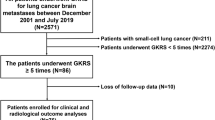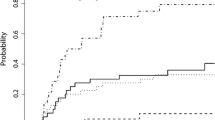Abstract
Optimal treatment of brain metastases (BMs) is debatable. However, surgery or gamma knife radiosurgery (GKRS) improves survival when combined with whole brain radiotherapy (WBRT) versus WBRT alone. We retrospectively reviewed an institutional database of patients treated with GKRS for BMs from 1998 to 2013 to explore effects of single or multi-modality therapies on survival. There were 528 patients with median age 62 years. Histologies included 257 lung, 102 breast, 62 melanoma, 40 renal cell, 29 gastrointestinal, and 38 other primary cancers. Treatments included: 206 GKRS alone, 111 GKRS plus WBRT, 109 GKRS plus neurosurgical resection (NSG), and 102 all three modalities. Median overall survival (mOS) was 16.6 months. mOS among patients with one versus multiple metastasis was 17.2 versus 16.0 months respectively (p = 0.825). For patients with one BM, mOS following GKRS alone, GKRS plus WBRT, GKRS plus NSG, and all three modalities was 9.0, 19.1, 25.5, and 25.0 months, respectively, and for patients with multiple BMs, mOS was 8.6, 20.4, 20.7, 24.5 months for the respective groups. Among all patients, multivariate analysis confirmed that tri-modality group had the longest survival (HR 0.467; 95 % CI 0.350–0.623; p < 0.001) compared to GKRS alone; however, this was not significantly different than bi-modality approaches. Uncontrolled primary extra-CNS disease, age and KPS were also independent predictors of survival. Patients treated with GKRS plus NSG, GKRS plus WBRT, or all three modalities had improved OS versus GKRS alone. In our analysis, resection and GKRS allowed avoidance of WBRT without shortening survival.


Similar content being viewed by others
References
Mehta MP, Tsao MN, Whelan TJ et al (2005) The American Society for Therapeutic Radiology and Oncology (ASTRO) evidence-based review of the role of radiosurgery for brain metastases. Int J Radiat Oncol Biol Phys 63(1):37–46
Gavrilovic IT, Posner JB (2005) Brain metastases: epidemiology and pathophysiology. J Neurooncol 75(1):5–14
Tsao MN, Rades D, Wirth A et al (2012) Radiotherapeutic and surgical management for newly diagnosed brain metastasis (es): an American Society for Radiation Oncology evidence-based guideline. Pract Radiat Oncol 2(3):210–225
Sperduto PW, Chao ST, Sneed PK et al (2010) Diagnosis-specific prognostic factors, indexes, and treatment outcomes for patients with newly diagnosed brain metastases: a multi-institutional analysis of 4,259 patients. Int J Radiat Oncol Biol Phys 77(3):655–661
Gaspar LE, Mehta MP, Patchell RA et al (2010) The role of whole brain radiation therapy in the management of newly diagnosed brain metastases: a systematic review and evidence-based clinical practice guideline. J Neurooncol 96(1):17–32
Kalkanis SN, Kondziolka D, Gaspar LE et al (2010) The role of surgical resection in the management of newly diagnosed brain metastases: a systematic review and evidence-based clinical practice guideline. J Neurooncol 96(1):33–43
Linskey ME, Andrews DW, Asher AL et al (2010) The role of stereotactic radiosurgery in the management of patients with newly diagnosed brain metastases: a systematic review and evidence-based clinical practice guideline. J Neurooncol 96(1):45–68
Andrews DW, Scott CB, Sperduto PW et al (2004) Whole brain radiation therapy with or without stereotactic radiosurgery boost for patients with one to three brain metastases: phase III results of the RTOG 9508 randomised trial. Lancet 363(9422):1665–1672
Patchell RA, Tibbs PA, Walsh JW et al (1990) A randomized trial of surgery in the treatment of single metastases to the brain. N Engl J Med 322(8):494–500
Aoyama H, Shirato H, Tago M et al (2006) Stereotactic radiosurgery plus whole-brain radiation therapy vs stereotactic radiosurgery alone for treatment of brain metastases: a randomized controlled trial. JAMA, J Am Med Assoc 295(21):2483–2491
Chang EL, Wefel JS, Hess KR et al (2009) Neurocognition in patients with brain metastases treated with radiosurgery or radiosurgery plus whole-brain irradiation: a randomised controlled trial. Lancet Oncol 10(11):1037–1044
DeAngelis LM, Delattre JY, Posner JB (1989) Radiation-induced dementia in patients cured of brain metastases. Neurology 39(6):789–796
Yamamoto M, Serizawa T, Shuto T et al (2014) Stereotactic radiosurgery for patients with multiple brain metastases (JLGK0901): a multi-institutional prospective observational study. Lancet Oncol 15(4):387–395
Gaspar L, Scott C, Rotman M et al (1997) Recursive partitioning analysis (RPA) of prognostic factors in three Radiation Therapy Oncology Group (RTOG) brain metastases trials. Int J Radiat Oncol Biol Phys 37(4):745–751
Sperduto PW, Berkey B, Gaspar LE, Mehta M, Curran W (2008) A new prognostic index and comparison to three other indices for patients with brain metastases: an analysis of 1,960 patients in the RTOG database. Int J Radiat Oncol Biol Phys 70(2):510–514
Kaplan EL, Meier P (1958) Nonparametric estimation from incomplete observations. J Am Stat Assoc 53(282):457–481
Antoni D, Clavier JB, Pop M, Schumacher C, Lefebvre F, Noel G (2013) Institutional, retrospective analysis of 777 patients with brain metastases: treatment outcomes and diagnosis-specific prognostic factors. Int J Radiat Oncol Biol Phys 86(4):630–637
Yamamoto M, Sato Y, Serizawa T et al (2012) Subclassification of recursive partitioning analysis Class II patients with brain metastases treated radiosurgically. Int J Radiat Oncol Biol Phys 83(5):1399–1405
Sperduto PW, Kased N, Roberge D et al (2012) Summary report on the graded prognostic assessment: an accurate and facile diagnosis-specific tool to estimate survival for patients with brain metastases. J Clin Oncol 30(4):419–425
Sneed PK, Suh JH, Goetsch SJ et al (2002) A multi-institutional review of radiosurgery alone vs. radiosurgery with whole brain radiotherapy as the initial management of brain metastases. Int J Radiat Oncol Biol Phys 53(3):519–526
Conflict of interest
None.
Author information
Authors and Affiliations
Corresponding author
Electronic supplementary material
Below is the link to the electronic supplementary material.
Rights and permissions
About this article
Cite this article
Wang, T.J.C., Saad, S., Qureshi, Y.H. et al. Outcomes of gamma knife radiosurgery, bi-modality & tri-modality treatment regimens for patients with one or multiple brain metastases: the Columbia University Medical Center experience. J Neurooncol 122, 399–408 (2015). https://doi.org/10.1007/s11060-015-1728-y
Received:
Accepted:
Published:
Issue Date:
DOI: https://doi.org/10.1007/s11060-015-1728-y




